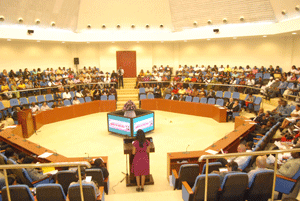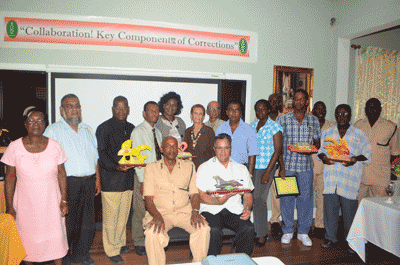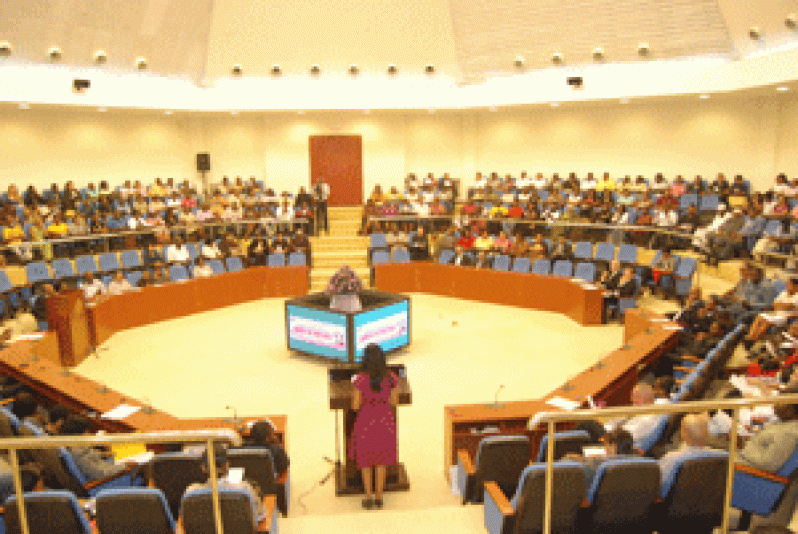THE Guyana Prison Service (GPS) yesterday honoured, at the Duke Lodge in Kingston, Georgetown, major collaborators who have each made a significant impact on prison management in Guyana.
 This formed part of the 29th Anniversary of “Prison Service Week” currently being celebrated.
This formed part of the 29th Anniversary of “Prison Service Week” currently being celebrated.
In delivering the feature address, Director of Prisons Dale Erskine said that, in practice, the prison system is the ultimate power that democratic states exercise over their citizens.
“The degree of civilisation in a society can be judged by entering its prisons,” he said. This comment was supported by the famous South African Statesman Nelson Mandela, who said that a country’s civilisation can be judged by the way it treats its prisoners,” Mr Erskine said.
“These comments are made against the backdrop of the functions that the prison system plays in the fight against crime in the criminal justice system, through retribution, deterrence, rehabilitation, and public safety,” Erskine stated.
He noted that each of those functions requires close collaboration at levels which includes pre-detention.
He spoke of the key collaboration with (the) Sentence Management Board, the business community, churches, and other support agencies and individuals to assist reintegrating prisoners into  society.
society.
The Ministry of Home Affairs and the Guyana Prison Service are working actively to bring these stakeholders together, Erskine said.
“This is articulated in our Strategic Plan 2012-2020, which speaks of a new vision for the Guyana Prison (Service) with an eight-pillar development plan. Hence it is not business as usual,” he declared.
He said that the existing state of the Guyana Prison Service, its strategic direction, the critical factors that have underpinned its success, and the status of the previous strategic plan have provided a ready basis to identify strategic goals that would begin the journey towards the future that the GPS has envisaged for itself.
Although the vision projects a 10-year horizon, this plan speaks to the first five years of that vision, and these goals provide the building blocks for the transformation of the GPS, he posited.
This vision has a time horizon of ten years, although, conscious of its limitations and challenges, the GPS has developed this five-year plan as the first phase of the journey to excellence, he declared.
Operating principles of the GPS are
* Loyalty, equity and commitment
* Efficiency
* Accountability
* Safety
* Rehabilitation
* Integrity
* Partnerships/ collaboration
* Being people-centred
The Director of Prisons noted that the vision of the community is that offenders who are empowered with changed mind-sets and skills can take their places as productive, law-abiding citizens, and successfully reintegrate into society through strong networks and community business partnerships that are facilitated.
He said the mission of the Guyana Prison Service is that, as an integral part of the criminal justice system, it would utilise international standards and practices to provide a secure environment for staff and offenders. Through these approaches, offenders are rehabilitated and reintegrated into society as law abiding citizens, thus contributing to public safety, which is critical for national development.
Erskine said the strategic goals of the GPS are
* Modernising and securing the prisons’ estate infrastructure.
* Modernising penal legislation and restructuring the GPS.
* Enhancing human resource management, and developing the GPS.
* Restructuring prison enterprises.
* Strengthening inter-agency collaboration in the criminal justice system.
* Promoting successful offender reintegration into society.
* Rebuilding public confidence and trust.
* Promoting holistic healthcare in prisons.
Erskine explained that these strategic goals will form the pillars upon which the plan will be developed.
For each goal, objectives will be identified with the corresponding performance measures, and the activities necessary to achieve these objectives. These will be closely aligned to the critical success outcomes.
“Prison cannot be business as usual, as we need to respond to the changing times of a growing concern of the humanitarian nature of prisons, security, and ability to restore inmates to (being) respectable citizens.” He said. Erskine reminded that Guyana’s inmate population comes from all walks of life and from various class strata within the society; hence each inmate has a different need.
Various members of the GPS were presented with tokens of appreciation for their commitment to, and dedication towards, their work.
The awardees are as follows:
Justice Oslen Small
Mrs. Erma Bovell
Capt. Gerry Gouveia, AA
Mr. Beni Sankar
Mr. & Mrs. Robert Francis
Mr. Samuel Dasraj
Mr. Rabindra Chand
Mr. Eustace Gibson
Ms. Sylvia Conway,
Mr. Matadial
The EX-Prison Officers’ Association
Mr. Fizy Rahaman
Mr. Humphrey













